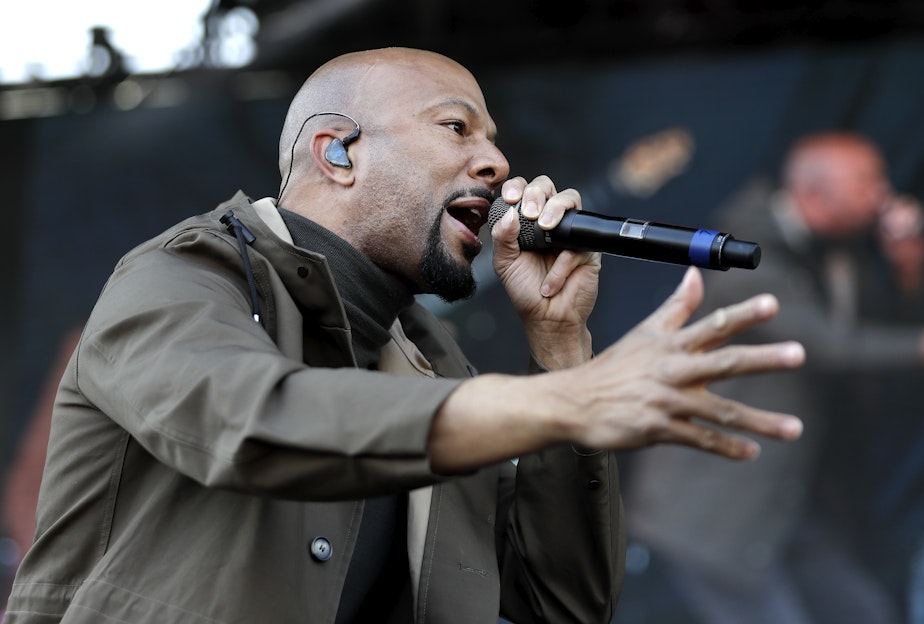Rapper Common talks 50 years of hip-hop and hopes for the industry’s future

Award-winning rapper, actor, and activist Common is a hip-hop legend with an illustrious career spanning decades. At 51, he’s been alive for as long as the genre itself, which celebrated 50 years of existence in August.
KUOW arts and culture reporter Mike Davis caught up with Common ahead of his recent performance at Seattle’s Benaroya Hall. They reflected on his hip-hop roots and the lessons he’s learned along his journey as a multidisciplinary artist.
“Hip-hop was the avenue that allowed me to feel like I could be something and express myself, discover who I am, and be proud of that — not only from the records that I was hearing from other artists, but as an artist,” Common said. “And with that, I started to develop my purpose of who I am in the world.”
The rapper shared an anecdote about briefly losing sound during a past performance in Seattle. With no choice but to roll with the punches and wing it, Common saw the moment as a metaphor for the art form he’s dedicated his life to.
“Hip-hop came from a place of people not having all the perfect instruments, new music theory, or even having the resources to create the best productions,” he said. “But they made something beautiful, and now it has influenced the world.”
Sponsored
Elaborating on the ingenuity tied to hip-hop’s foundation, Common pointed to the various components that make the culture what it is.
“It really brought in all these different elements — it’s graffiti, it’s DJing, it’s MCing, it’s breakdancing…it's even the way we dress,” he said. “It kind of kept the tradition moving forward, meaning hip-hop used jazz music samples, hip-hop sampled rock music, hip-hop sampled rhythm and blues and soul music from different genres…so it really kept certain traditions alive and moved them forward and introduced them to new generations.”
Common’s latest release, “A Beautiful Revolution Pt. 2,” is his 14th studio album. The 2021 project is true to hip-hop’s crossover origins, containing moments of poetry and splashes of Afro-beats, as well as plenty of nostalgia for classic hip-hop.
Fans can anticipate even more sentimentality for eras of hip-hop’s past in the rapper’s upcoming collaboration with iconic music producer and DJ Pete Rock, which draws inspiration from the genre’s greatest sounds of the 1990s.
“I think we appreciate that era because there's so much love and joy in that music,” Common said. “It's just a love for the art form — an appreciation and a desire to be great.”
Sponsored
“We can look at some of those '90s classics — that Biggie, and NAS, and Tupac, and Wu-Tang and Pharcyde,” he added. “I think that spawned some of the best music and it allows us to go back and just appreciate it. And what Pete Rock and I are doing is…carrying the spirit of what that era had. And it's in the essence of what we know quality hip-hop to be like.”
But reminiscence isn’t the only thing on the rapper’s mind. He’s also got a vision for the hip-hop industry’s future.
“I would love to see hip-pop have a union, where the participants have union benefits. And I would love to see the artists from the past get that type of reparation…treatment and payment, so that they could get paid off that in the right way or have health care in the right way…just be treated the same way as actors have [in the] Screen Actors Guild,” Common said, adding that many of the genre’s giants have gone without compensation for widely used samples of their work.
He also indicated that he’d like to see hip-hop’s influence become even more ubiquitous, further infiltrating other cultures and scenes.
“I love seeing hip-hop being…created internationally,” he said. “I would love to continue to see that — like where you hear hip-hop in London, and France, and in Nigeria. I would love to see hip-hop also deliver its artistry and greatness in different forms, like maybe books, and be recognized as one of the greatest art forms to exist on the planet.”
Sponsored
Listen to Soundside's full interview with Common by clicking the play icon at the top of this story.






